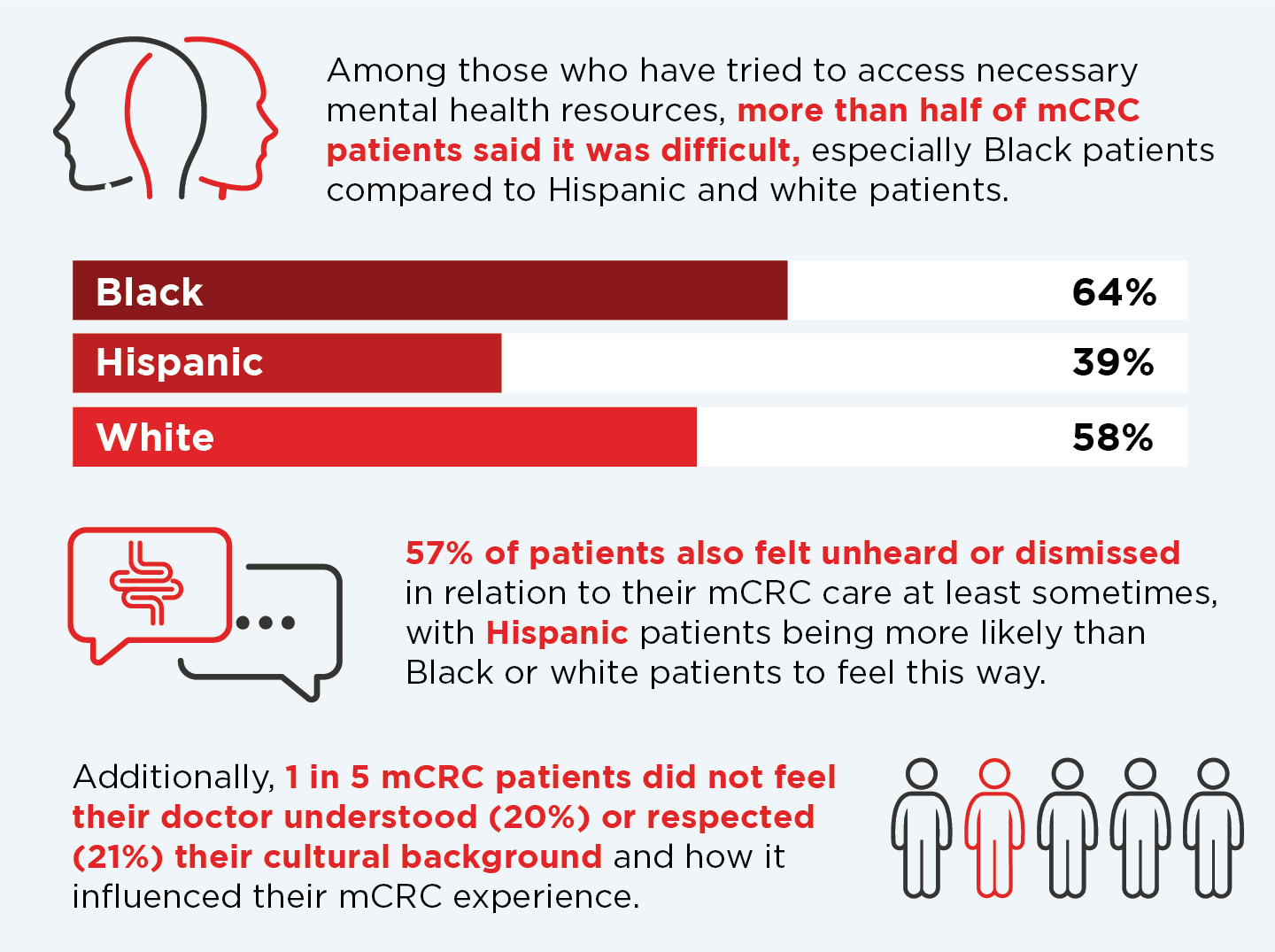DEV!!!!!!!!!Listening to the metastatic colorectal cancer (mCRC) community: Insights that drive better care and education

Understanding mCRC
Colorectal cancer (CRC), which impacts the large intestine, is one of the most common cancers worldwide. Even with improved awareness of CRC, about 20% of patients are diagnosed at an advanced stage of disease – known as metastatic colorectal cancer, or mCRC – underscoring the vital importance of regular screening, regardless of symptoms, as early detection can often improve outcomes.1,2 Despite its prevalence, we’ve heard from the community that significant gaps in care and resources remain, especially for those with mCRC.
To support those living with mCRC and identify their most pressing needs, Takeda collaborated with four U.S. patient advocacy groups to conduct a nationwide survey* to hear directly from patients. The findings highlighted the importance of educational materials that address both medical information and the realities of daily life with mCRC, including how patients can be more empowered to facilitate conversations with their doctors. This platform, built on insights from real patients like Jenna, aims to offer essential tools and resources for those affected by this disease.
Now, Jenna is sharing her story in the hopes of inspiring others with mCRC to advocate for themselves: “I realized, if I have to live with this, I really need to make some changes, and my mCRC treatment is going to have to work for me – not only for what the doctor thinks is best for me, but for my lifestyle.”

Living with mCRC
Jenna’s mCRC symptoms – severe abdominal pain and vaginal and rectal bleeding – started when she was seven months pregnant with her son. They persisted post-birth, prompting her to see a primary care physician who ultimately referred her to a gastrointestinal (GI) specialist.
Like Jenna, some people who are living with mCRC may experience significant impacts to their quality of life based on the physical and emotional burdens of their symptoms and treatment:
- Moderate or severe physical symptoms, including weakness or fatigue, rectal bleeding, cramping or abdominal pain, can last for weeks.3
- Mental health challenges like anxiety and depression.4
Additionally, disparities in care persist, with notable differences in CRC rates among certain groups:
- Black Americans have approximately a 20% higher likelihood of developing CRC and a 40% higher mortality rate compared to other racial groups in the U.S.5
- Other factors that could influence CRC experience include socioeconomic status, access to insurance and geographic location.
Jenna’s Metastatic Colorectal Cancer Journey
Jenna is a devoted wife, mother and full-time executive at a tech and entrepreneur-focused non-profit, who was diagnosed with mCRC shortly after giving birth to her son. Despite her health challenges, Jenna’s resilience shines through as she balances her professional and personal life and now helps others navigate their mCRC journeys. Learn more about her story below.


Receiving a cancer diagnosis can be unexpected and overwhelming. Having access to the right information after your diagnosis can help make appointments with your care team feel more manageable. Download our mCRC Factsheet for more information on signs, symptoms and treatment.
Taking the Lead in mCRC Conversations with Doctors
It’s normal to have concerns about how your treatment plan will impact your personal goals and priorities. Watch the discussion below with Jenna and Dr. Mahipal, an oncologist and professor with deep experience treating mCRC at University Hospitals in Cleveland, Ohio, to prepare for treatment conversations with your own care team.

A Closer Look into mCRC Community Insights
Joined by a passion to make a difference for advanced CRC patients, like Jenna, Takeda and four patient advocacy groups launched a U.S. survey to hear directly from patients and the community about mCRC and treatment navigation. Through this collaborative effort, we uncovered actionable insights that can help guide and support patients with mCRC.

Journey to Diagnosis
mCRC patients experience an average gap of 1.4 years between the onset of symptoms and an initial CRC diagnosis. Almost one-third (31%) reported a delay in diagnosis. While 33% believe greater awareness of the condition may have led to a quicker diagnosis. At initial diagnosis, only 57% of mCRC patients knew where to find others with mCRC to connect with and share their experience.

Cultural Influences in Care
Among those mCRC patients who sought out necessary mental health care, more than half experienced barriers to access. Black patients reported the most difficulty (64%) in accessing care, compared to 39% of Hispanic patients and 58% of white patients. Additionally, 57% of patients felt unheard or dismissed in relation to their mCRC care at least sometimes, with Hispanic patients being more likely to feel this way. One in five patients (20%) felt their doctor didn’t understand, and 21% felt their doctor didn’t respect how their cultural background influenced their mCRC experience.

Speaking Up Matters
Nearly three-fourths (74%) of mCRC patients felt overwhelmed by the information their provider gave them upon initial diagnosis. Throughout their cancer journey, 79% of mCRC patients said there had been times they felt alone in their experience, and 83% wish it was easier for other patients like them to navigate the healthcare system. While many patients described receiving necessary care for mCRC as “easy,” 39% had a difficult time.
Download the full infographic
Understanding mCRC
Colorectal cancer (CRC), which impacts the large intestine, is one of the most common cancers worldwide. Even with improved awareness of CRC, about 20% of patients are diagnosed at an advanced stage of disease – known as metastatic colorectal cancer, or mCRC – underscoring the vital importance of regular screening, regardless of symptoms, as early detection can often improve outcomes.1,2 Despite its prevalence, we’ve heard from the community that significant gaps in care and resources remain, especially for those with mCRC.
To support those living with mCRC and identify their most pressing needs, Takeda collaborated with four U.S. patient advocacy groups to conduct a nationwide survey* to hear directly from patients. The findings highlighted the importance of educational materials that address both medical information and the realities of daily life with mCRC, including how patients can be more empowered to facilitate conversations with their doctors. This platform, built on insights from real patients like Jenna, aims to offer essential tools and resources for those affected by this disease.
Now, Jenna is sharing her story in the hopes of inspiring others with mCRC to advocate for themselves: “I realized, if I have to live with this, I really need to make some changes, and my mCRC treatment is going to have to work for me – not only for what the doctor thinks is best for me, but for my lifestyle.”
Meet our Patient Advocacy Partners
 Opens in a new window.
Opens in a new window.BLKHLTH is an Atlanta-based non-profit with a mission to advance the health of Black communities through equity-centered education, advocacy, research and programs.
Built by and for colorectal cancer patients and caregivers, COLONTOWN embraces each member with a supportive community and empowers through peer-led educational and outreach programs. The organization prioritizes hiring patients and caregivers for flexible, meaningful work and volunteer roles.
Founded 25 years ago by more than 40 CRC survivors, caregivers and friends, the Alliance advocates for screening, magnifies patient support and accelerates research.
Hear From our
Patient Advocacy Partners
Background
*Harris Poll Survey of 344 US adults aged 18+ diagnosed with stage 4 colon, rectal or colorectal cancer fielded January 17 - February 7, 2024.
The research was conducted online in the United States by The Harris Poll on behalf of Takeda among 344 U.S. adults age 18+ diagnosed with stage 4 colon, rectal, or colorectal cancer, of which, 90 respondents were recruited via patient advocacy groups (BLKHLTH, COLONTOWN, Colorectal Cancer Alliance, and Family Reach). The survey was conducted January 17 – February 7, 2024. Raw data were not weighted and are therefore only representative of the individuals who completed the survey.
Respondents for this survey were selected from among those who have agreed to participate in our surveys. The sampling precision of Harris online polls is measured by using a Bayesian credible interval. For this study, the sample data is accurate to within + 5.3 percentage points using a 95% confidence level. This credible interval will be wider among subsets of the surveyed population of interest.
All sample surveys and polls, whether or not they use probability sampling, are subject to other multiple sources of error which are most often not possible to quantify or estimate, including, but not limited to coverage error, error associated with nonresponse, error associated with question wording and response options, and post-survey weighting and adjustments.
References
1 Biller LH, Schrag D. Diagnosis and Treatment of Metastatic Colorectal Cancer: A Review. JAMA. 2021;325(7):669-685. doi:10.1001/jama.2021.0106
2 Atreya CE, Yaeger R, Chu E. Systemic therapy for metastatic colorectal cancer: from current standards to future molecular targeted approaches. Am Soc Clin Oncol Educ Book. 2017;37:246-256. doi:10.1200/EDBK_175679
3 American Cancer Society. Colorectal Cancer Signs and Symptoms. https://www.cancer.org/cancer/types/colon-rectal-cancer/detection-diagnosis-staging/signs-and-symptoms.html. Last accessed May 2025.
4 Rosangela Caruso, Mara Giulia Nanni, Michelle B. Riba, Silvana Sabato & Luigi Grassi (2017) The burden of psychosocial morbidity related to cancer: patient and family issues, International Review of Psychiatry, 29:5, 389-402, DOI: 10.1080/09540261.2017.1288090
5 American Cancer Society. Colorectal Cancer Rates Higher in African Americans, Rising in Younger People. Available at: https://www.cancer.org/cancer/latest-news/colorectal-cancer-rates-higher-in-african-americans-rising-in-younger-people.html. Last accessed May 2025.


